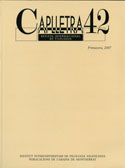Acusatiu preposicional i dislocació amb clític
DOI:
https://doi.org/10.7203/caplletra.42.4823Keywords:
Prepositional accusative, clitic dislocation, topicality Abstract
Abstract
Catalan is usually described as a language without prepositional accusative, with the only exception of some pronouns. The aim of this paper is to present some data
showing that in most spoken varieties prepositional accusatives are indeed licensed in a specific construction, namely when appearing as topics in Clitic-Dislocation.
Interestingly enough, the preposition is systematically excluded with rhematic, nontopical, objects. Dialects differ with respect to the conditions governing the use of the
preposition with topics: whereas in written Catalan the preposition appears with pronouns only, spoken Central Catalan extends its use to proper names and human
definites as well, and Ibizan shows the wider extension of the phenomenon, with prepositional marking for almost all kinds of topics (pronouns, proper names, human and non-human definites, and even inanimate indefinites). This shows that for
Catalan the crucial factor for the occurrence of prepositional accusatives is topicality –not definiteness or animacy, as in Spanish.
 Downloads
Downloads
Downloads
Published
How to Cite
-
Abstract509
-
PDF (Català)244
Issue
Section
License
Authors submitting work to Caplletra for publication must be the legitimate holder of the usage rights. Legitimacy for the purposes of publishing the work must also include images, tables, diagrams and any other materials that may complement the text, whether they are the author of such material or not.
Copyright: on publishing their work in the journal, the author grants Caplletra. Revista Internacional de Filologia usage rights (reproduction, distribution and public communication) for both the paper printed version and for the electronic version.
All work published in Caplletra is covered by the Creative Commons license type Attribution-NonCommercial-NoDerivatives 4.0 (CC BY-NC-ND 4.0).
RESPONSABILITY
Caplletra. Revista Internacional de Filologia does not necessarily identify with the points of view expressed in the papers it publishes.
Caplletra. Revista Internacional de Filologia accepts no responsibility whatsoever for any eventual infringement of intellectual property rights on the part of authors.






